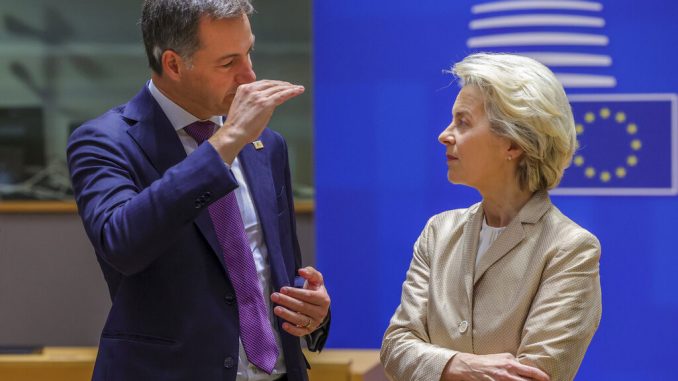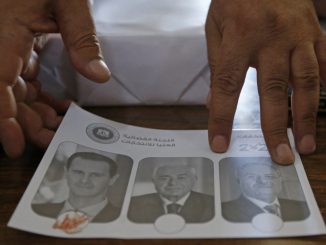

Belgium’s Prime Minister Alexander de Croo, left, and European Commission President Ursula von der Leyen talk before the second day’s session of an extraordinary meeting of EU leaders to discuss Ukraine, energy and food security at the Europa building in Brussels, Tuesday, May 31, 2022. (AP Photo/Olivier Matthys)
OAN NEWSROOM
UPDATED 7:36 AM PT – Tuesday, May 31, 2022
The European Union agreed to ban almost 90 percent of Russian oil by the end of this year. The council reached a consensus on the latest sanctions at its summit in Brussels on Tuesday.
All Russian oil imports by sea will be banned under the motion, but fuel transported via pipeline will still be imported by EU member states. European Commission President, Ursula von der Leyen acknowledged the inconsistency, but voiced intentions of blocking all Russian oil from the Eurozone in the future.
“And indeed, here we have agreed this is for the moment being exempted,” she stated. “We have agreed that the council will revert to the topic as soon as possible in one way or the other, so this is a topic where we will come back to and where we will still have to work on.”
The move follows Ukrainian President Volodymyr Zelensky’s demand for the EU to terminate its purchasing on Russian fuel as Europe receives 40 percent of its natural gas and 25 percent of its oil from the Russian Federation.
I welcome the #EUCO agreement tonight on oil sanctions against Russia.
This will effectively cut around 90% of oil imports from Russia to the EU by the end of the year.
— Ursula von der Leyen (@vonderleyen) May 30, 2022
Von de Leyen also announced the removal of Russia’s largest bank and several institutions from the SWIFT financial transaction system.
“This is good that we now de-SWIFT the Sberbank,” she continued. “There is a ban on insurance and re-insurance of Russian ships by EU companies, a ban on providing Russian companies with a whole range of business services and very important, the suspension of broadcasting in the European Union of three further Russian state outlets that were very typically spreading broadly the misinformation that we have witnessed over the last weeks and months.”
The new sanctions, which must be approved by all 27 member states, are expected to be enacted on Wednesday. The measure was initially proposed early this month, but was stonewalled by Hungary, Slovakia and the Czech Republic over energy security concerns.





Be the first to comment